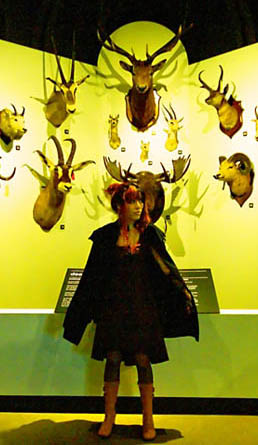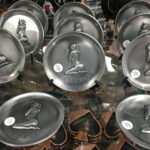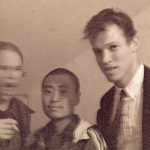La Carmina is a professional alternative-cultures blogger, Huffington Post and CNNGo travel/culture journalist, travel TV host, and author of three Jpop books. Her popular blog has been featured in publications such as the Washington Post, the Los Angeles Times, and the New Yorker (which called her, “adorable, in a somewhat bizarre way”). She has co-hosted an episode of Bizarre Foods with Andrew Zimmern for the Travel Channel, and appeared on international travel shows for NHK, Canal +, Sony, National Geographic and more. A native of Canada, La Carmina is a graduate of Columbia University and Yale Law School.
How did you get started traveling?
I first boarded an airplane at the age of one. Almost every year, my parents and I flew from Vancouver to Hong Kong (where they are from). Travel has always been important to us, so by the time I was a teen, I had visited the major cities of Asia, North America and Europe. Today, I’m very lucky that my work as a travel writer/TV host sends me around the world — especially to Tokyo.
How did you get started writing?
I never thought I’d become a professional writer. English and social sciences were my strong subjects, but I couldn’t picture myself at a desk, stringing together Who Where What facts in an objective tone. I wanted drama, decadence, adventure! While studying at Columbia University, I wrote long emails to friends about my New York escapades. That’s when I realized I enjoyed writing about travel and youth subcultures — in my own voice and on my own terms.
What do you consider your first “break” as a writer?
I received a book deal at age 19. It truly was a fluke. I was helping an employer with a book proposal — and on a whim, decided to write one myself. Emailed it to a single publisher, and they offered me a deal. It was a superb experience, so I continued down this path. I’ve now written three books about Japanese pop culture and travel.
As a traveler and fact/story gatherer, what is your biggest challenge on the road?
I believe that to savor the full experience, you must fling yourself into the action. So if you’re covering a Tokyo cybergoth party, swallow the absinthe and dance until dawn with the drag queens! But once it’s over, you can’t fall into bed. Must keep eyes open to jot down names, details. And if there’s a deadline the next day, there’s no choice but to meet it.
My “nightcrawler” friends and I will often say to each other: “Strong!” A travel journalist must buck up and persevere through dismal weather, sleep deprivation, and my personal Satan: mosquitoes. Not everyone has the stamina and go-getter motivation to make it through.
What is your biggest challenge in the research and writing process?
I insist on first-hand experiences. Research is important, but it’s never the same as being there in the flesh. I also speak to many people to understand their experiences. The personal aspect should drive the story, every time.
What is your biggest challenge from a business standpoint?
Travel writing and TV hosting assignments come in ebbs and flows, and dry spells can be stressful. However, I much prefer to be myself and do what I love (with periods of uncertainty) than to have a steady, well-paid, just-shoot-me job.
Have you ever done other work to make ends meet?
I am constantly working on various projects, all of which have to do with my passions. La Carmina Blog is monetized. I write books for major publishers, and regular articles for CNNGo and Lip Service. I’ve created and collaborated on several fashion lines. I sell clothing via my Online Garage Sale. I started a Japan consulting/coolhunting/TV fixing and hosting business, La Carmina & The Pirates. That’s only the tip of the iceberg.
What travel authors or books might you recommend and/or have influenced you?
I have a confession: I find most travel books to be long-winded snores. I’d say my style is far more influenced by adventure novels, such as The Three Musketeers and Treasure Island. (I am a Pirate, after all!) I refused to make my book Crazy, Wacky Theme Restaurants: Tokyo a typical travel guide. Instead, it’s packed with photos of my “spooky friends” and stories of our bizarre nights out. I love the highly personal approach of blogging, and try to bring that to my travel writing.
What advice would you give to someone who is considering going into travel writing?
Read and write, rinse and repeat. Be obsessive about improving your skills. In this competitive field, there’s no way around it: the writing must stand up.
And the writers must stand out. Focus on a niche, and strive to be at the top. Many agents and editors have come to me because they enjoy my blog about “Cool Japan” pop culture. For both budding and established travel journalists, blogging is an excellent way to showcase your work.
Finally, reach out. Be active on social networks. Send out those “scary” emails. Writing opportunities will never fall into your lap, so be a pirate— sail forth and plunder, in the never-ending quest for gold!
What is the biggest reward of life as a travel writer?
The ability to bring individuals and cultures I care about into the light. For example: I successfully pitched articles about an alternative arts festival and Visual Kei bands to CNNGo, and these made the front page of CNN Asia. Many youth/alt cultures are hidden or stigmatized, and I feel great when I can write about them in an understanding light.





